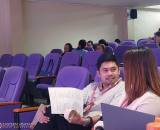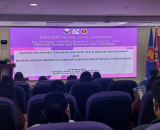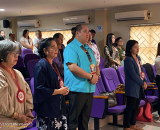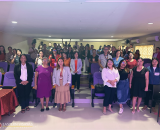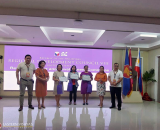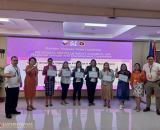Tacloban City, Philippines– Gender and Development Program (GAD) experts from various government agencies and state universities in collaboration with EVSU’s Gender and Development Office, headed by its Director, Dr. Fatima Socorro M. Quianzon, gathered in a 2-day extensive gender sensitivity training. The event aimed to spread awareness and orientation of GAD through a pool of certified GAD resource persons. The training began at exactly 8:30 AM on the 13th day of August and was held in the ORDEXs studio room, ORDEXs building EVSU main campus.
The first day of the event was a blockbuster and it kicked off with a strong introductory message from the Co-Chairperson of RGADC VIII and founder/CEO of Women Enablers Advocates and Volunteers for Empowering and Responsive Solutions (WEAVERS), Inc., Paulina L. Nayra. Ms. Nayra adeptly opened the program and shared an intelligible overview of the activity. “This will give everyone an orientation of GAD, basically, but there are other topics that will enhance our gender and development knowledge that we can apply at work.” “We aim to mainstream GAD, for the purpose of gender equity, therefore, there will be gender equality,” stated Nayra.
Following Ms. Nayra was the warm welcome message of the vice president for Research, Extension and Development, Dr. Analyn C. Españo and the motivating message of congratulation by the university president, Dr. Dennis C. de Paz. Both university officials spoke about the significance of GAD training as a tool to expand the needed awareness in the EVSU community. In addition, they extended their utmost support to this unifying advocacy.
The event introduced various expert resource speakers and included topics like the basic concept of GAD and the role of institutions. Ms. Donabelle L. Abalo, of LGU Oras Eastern Samar discussed the basic theories of GAD e.g., The Distinction of Women and Men, Sex and Gender Roles, Gender Socializing Institutions to name a few. As a means to illustrate gender disparities and bias, Ms. Abalo mentioned a place in Samar, where it is a prevalent culture for the parents and guardians to favor women over men for the sole reason of marrying them off to AFAM (A Foreigner Assigned to Manila).
Maria Marvi S. Ogrimen-Bantang of Plan International Pilipinas Foundation, Inc. delivered an exemplary discussion on Sexual Orientation, Gender Identity, Expression, and Sex Characteristics (SOGIESC) and Gender Issues and Biases. She opened her talk by setting a safe space for queries and suggestions considering the sensitive nature of the topic. Several SOGIESC concepts and issues were tackled including gender binary, sexual orientation, gender identity, gender expression, gender issues and biases, and a lot more. An open discussion allowed the audience to express their uninhibited opinions, questions, and advice. It was raised that the goal of GAD in obtaining equality might be farfetched and that GAD’s messaging leans more toward feminism. To this, Prof. Marieta Bañez-Sumagaysay, former Director of DOST-NRCP and currently Professor 12 of Economics, UP Visayas Tacloban College stressed that the intention of GAD is not to pit men against women. That there should be no competition. It aims to understand that men have different needs than women therefore the intervention should be distinct. She added that there are other sectors to include, such as the LGBTQ+, disabled, youth, overaged children, and the rest of the marginalized members of the community.
Following the SOGIESC was the extensive discussion of Gender Analysis: Introduction and Common Tools, expertly delivered by Aivan Lloyd M. Calonia from the Department of Science and Technology. Gender Analysis is significant in identifying the gaps between women and men. Appropriate and effective tools are used to measure these disparities according to Mr. Calonia. Knowing the core of Gender Analysis and its common tools will bridge significant differences among genders measurably.
The topic Gender Responsive LGU (GeRL) Assessment Tool was wittily discussed by Annel Ruth D. Celis of Biliran Province State University at the end of the first day of the training. This tool enables LGU to gather data and information on the level of GAD mainstreaming efforts and practices to monitor and evaluate the gender-responsiveness of the organization and in the delivery of basic services and facilities.
On the second day of the training, the session began with a review of the topics covered on the first day. This recap was designed to gauge how well the participants had retained the information.
The first speaker, Ms. Letty Jean C. Lor from Visayas State University, highlighted the significance of the Harmonized Gender and Development Guidelines (HGDG). She explained how these guidelines are crucial for identifying programs and projects that address gender issues and biases.
Following her, Ms. Charmaine R. Oquina from Samar State University introduced and discussed the Gender Mainstreaming and Evaluation Framework (GMEF). She emphasized that the GMEF is a valuable tool for all government agencies, including State Universities and Colleges (SUCs), to measure the extent of their gender mainstreaming efforts.
Atty. Haidee O. Borja from the National Police Commission then stressed the importance of Gender and Development Planning and Budgeting. She pointed out that this is a core function required by the Philippine Commission on Women (PCW). She reminded the participants that all SUCs are mandated to submit GAD Planning and Budgeting (GPB) documents, which should allocate 5% of the university’s total General Appropriations Act (GAA) budget.
Finally, Dr. Maria Aurora Teresita W. Tabada shared some key takeaways and comprehensively synthesized the whole training. The two-day event concluded with a series of engaging and informative discussions that helped participants gain a deeper understanding of the main goals and functions of the Gender and Development Program. The training was deemed fruitful, leaving the attendees better equipped to address gender issues within their respective departments and institutions.
Written by: MSP | UMDC





